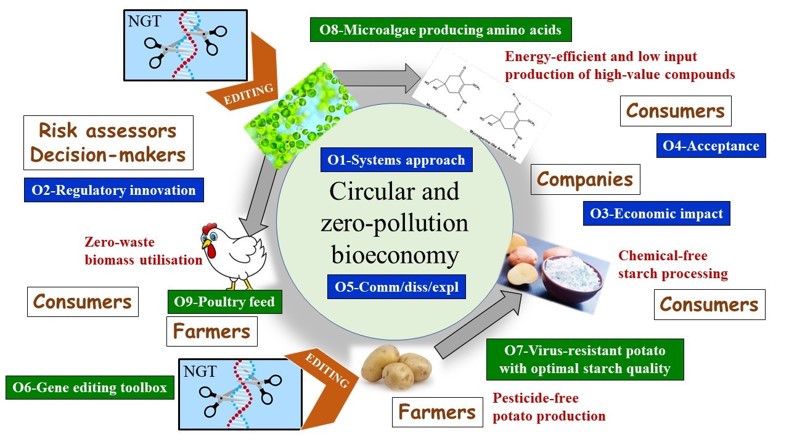GeneBEcon – capturing the potential of Gene editing for a sustainable BioEconomy

1 September 2022
GeneBEcon is an ambitious Horizon Europe-funded project that will examine the innovation potential of gene editing in enabling a sustainable bioeconomy in Europe. Through the application of this technology in potato and microalgae, GeneBEcon intends to promote energy-efficient, low-input, and zero-pollution agricultural production and clean industrial processing.
New Genomic Techniques (NGTs) are expected to represent a powerful toolbox (complementary to traditional breeding techniques) addressing current pressing challenges, including pollution and climate change. However, these techniques do not yet reach their full potential in Europe. GeneBEcon will advance research and innovation, acting on two fronts: through new gene editing developments at the technological level, as well as considering social, economic, and regulatory dimensions.
Among NGTs, gene editing holds the greatest potential for contributing to the ambitious objectives of the European Green Deal, the 2030 Climate Target Plan, and the Circular Economy Action Plan. However, risks and benefits must be fully understood to ensure that innovations with gene editing are developed in a responsible, inclusive, and transparent way. GeneBEcon aims to address these issues and propel Europe towards a cleaner, more sustainable and zero-pollution agricultural and industrial production.
GeneBEcon will construct a toolbox for gene editing for potato and microalgae, which will provide case studies to assess regulatory options, analyse the economic impact and assess societal perceptions. They would enable reduced use of pesticides in potato cultivation (notably through resistance to viruses, which incidence is expected to increase with global warming), chemical-free potato starch processing, and a resource-efficient and clean production of industrially relevant compounds from microalgae. Modified potato starch alone may save up to 75,000 tonnes of chemicals and 7.5 GWh of energy in the EU every year, and the repurposing of microalgae residual biomass as animal feed will considerably reduce waste production and CO2 emissions.
GeneBEcon has a budget of 5.5 million Euros over three years. It starts on 1 September 2022 and includes a multidisciplinary and multi-stakeholder consortium, including leading scientists from 11 European countries.
Partners:
- Swedish University of Agricultural Sciences, Sweden – Project Coordinator
- XPRO Consulting Limited, Cyprus
- SolEdits AB, Sweden
- Latvijas Universitate, Latvia
- FN3PT/inov3PT, France
- INRAE, France
- Euroseeds, Belgium
- Danish Technological Institute, Denmark
- Slovak University of Agriculture in Nitra, Slovakia
- EV ILVO, Belgium
- Plants for the Future ETP, Belgium
- Wageningen University, the Netherlands
- BVL, Germany
- Universität Bayreuth, Germany
- Sociedade Portuguesa de Inovação, Portugal
- HZPC Research BV, the Netherlands
- INVE Belgie, Belgium
- WBF-Agroscope, Switzerland
For more information, please contact:
Dennis ERIKSSON, Project Coordinator
Department of Plant Breeding, Swedish University of Agricultural Sciences, Sweden
E-mail: dennis.eriksson@slu.se
Website: https://www.slu.se/en/ew-cv/dennis-eriksson/
